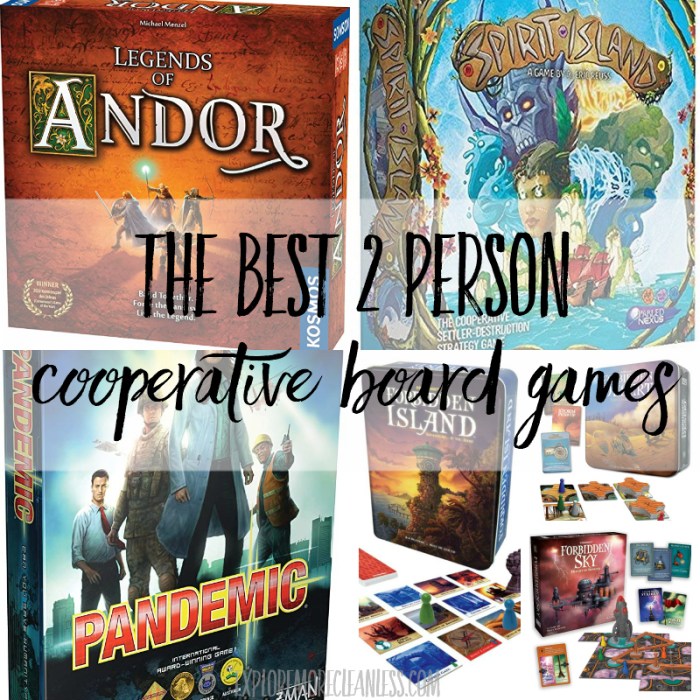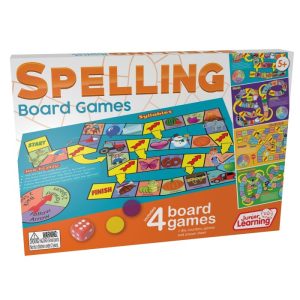
Embark on a thrilling adventure into the world of Cooperative Board Games, where teamwork and camaraderie take center stage, bringing players together in an immersive and engaging experience.
Discover the mechanics, benefits, and social aspects that make cooperative board games a unique and rewarding gaming choice for players of all ages.
Cooperative Board Games
Cooperative board games are a genre of tabletop games where players work together as a team to achieve a common goal or overcome challenges, rather than competing against each other. This collaborative gameplay fosters teamwork, communication, and strategic thinking among players.
Examples of Popular Cooperative Board Games
- Pandemic: In this game, players work as members of a disease control team to stop global outbreaks and find cures for four deadly diseases.
- Forbidden Island: Players must work together to retrieve treasures from a sinking island before it disappears underwater.
- Ghost Stories: Set in a haunted village, players must cooperate to fend off evil spirits and protect the village from being overrun.
Benefits of Playing Cooperative Board Games
- Encourages teamwork: Players must collaborate and communicate effectively to succeed in achieving the game’s objectives.
- Promotes social interaction: Cooperative games provide opportunities for players to bond, strategize, and problem-solve together.
- Builds problem-solving skills: Players are challenged to think critically and creatively to overcome obstacles and achieve victory as a team.
- Reduces competitiveness: Unlike competitive games, cooperative games emphasize mutual success and shared accomplishments rather than individual victory.
Mechanics of Cooperative Board Games
Cooperative board games are unique in that players work together towards a common goal rather than competing against each other. This collaborative gameplay requires a different set of mechanics compared to traditional competitive board games.
Types of Mechanics
- Communication: Effective communication is key in cooperative games as players need to strategize and make decisions together. Games like Pandemic and Forbidden Island rely heavily on communication mechanics.
- Resource Management: Many cooperative games involve managing limited resources to achieve the common goal. Players must allocate resources efficiently to succeed, as seen in games like Robinson Crusoe: Adventures on the Cursed Island.
- Role Specialization: Some cooperative games assign unique roles to each player, with special abilities or skills that contribute to the team’s success. For example, in Ghost Stories, each player has a specific role with distinct powers.
- Hidden Information: Some cooperative games incorporate hidden information or traitor mechanics, adding an element of mystery and suspense. The game Betrayal at Baldur’s Gate is a good example of this mechanic.
Comparison with Competitive Games
Unlike competitive board games where players aim to outperform each other, cooperative games foster teamwork and collaboration. The focus is on achieving a shared victory rather than individual success, creating a sense of camaraderie among players.
Innovative Mechanics
- Legacy Gameplay: Cooperative legacy games like Pandemic Legacy and Gloomhaven: Jaws of the Lion introduce evolving storylines and persistent consequences based on player choices, offering a unique gaming experience.
- Real-time Gameplay: Some cooperative games, such as Space Alert and Escape: The Curse of the Temple, incorporate real-time mechanics where players must act quickly under time pressure to achieve their objectives.
- Narrative-Driven: Cooperative games like T.I.M.E Stories and Chronicles of Crime focus on immersive storytelling, where players must work together to unravel mysteries and solve puzzles within a narrative framework.
Teamwork and Communication

In cooperative board games, teamwork and communication are essential components that can make or break a game. The ability to work together effectively and communicate clearly with your fellow players can greatly impact your chances of success.
The Importance of Teamwork
Teamwork is crucial in cooperative board games because each player brings a unique set of skills and abilities to the table. By working together and utilizing each player’s strengths, the team can overcome challenges and achieve their common goal. Without effective teamwork, players may struggle to coordinate their actions and make progress in the game.
Effective Communication Strategies
- Clearly State Intentions: Communicate your plans and intentions to your teammates so everyone is on the same page.
- Active Listening: Pay attention to what your teammates are saying and be open to their ideas and suggestions.
- Provide Feedback: Offer constructive feedback to help improve the team’s performance and decision-making process.
- Use Signals and Codes: Develop signals or codes to communicate important information quickly and efficiently during the game.
Immersive Gameplay
Cooperative board games have the unique ability to create immersive gaming experiences that deeply engage players in the gameplay. Through various mechanics and elements, these games transport players into different worlds where they must work together to overcome challenges and achieve common goals.
Storytelling Elements
Storytelling elements play a crucial role in enhancing the gameplay of cooperative board games. By incorporating narrative arcs, character development, and thematic elements, these games create a sense of purpose and urgency for players. The unfolding story not only adds depth to the gaming experience but also connects players on an emotional level, making the gameplay more engaging and memorable.
- Character backstories and motivations drive players to make strategic decisions based on the narrative.
- Plot twists and unexpected events keep players on their toes, adding excitement and suspense to the game.
- Thematic elements, such as setting and atmosphere, immerse players in the game world and enhance the overall experience.
Role of Theme and Narrative
The theme and narrative in popular cooperative board games are often carefully crafted to enhance the gameplay and create a cohesive gaming experience. Themes ranging from survival in a post-apocalyptic world to solving mysteries in a haunted mansion set the stage for players to immerse themselves in the game world and connect with the story being told.
For example, in games like Pandemic, the theme of coordinating global disease control not only adds urgency to the gameplay but also creates a sense of camaraderie among players working together towards a common goal.
- The narrative provides context for players’ actions and decisions, making them feel like integral parts of the story.
- Themes set the tone for the game and help establish the overall mood and atmosphere, contributing to the immersive experience.
- Well-developed themes and narratives can make players emotionally invested in the game, leading to memorable gaming sessions.
Solo Play in Cooperative Board Games
Cooperative board games are traditionally designed for group play, emphasizing teamwork and communication. However, recent trends have seen an increase in the incorporation of solo play options in cooperative board games, catering to a wider audience of players who may not always have a group available to play with.
Trend of Incorporating Solo Play Options
In response to the growing demand for solo gaming experiences, many board game designers have started to include solo play variants in their cooperative games. This trend allows players to enjoy the immersive gameplay and strategic challenges of cooperative board games even when playing alone.
Comparison of Solo Play versus Group Play
Playing cooperative board games solo offers a different experience compared to playing with a group. Solo play allows for more flexibility in terms of timing and pace, as well as the ability to fully immerse oneself in the game without interruptions. On the other hand, playing with a group brings the social aspect of collaboration and discussion, creating a dynamic and interactive experience.
Tips for Maximizing the Solo Play Experience
- Choose cooperative board games with solo play variants specifically designed for single players.
- Set up a dedicated gaming space free from distractions to fully focus on the game.
- Take on the role of multiple characters to enhance the strategic depth and challenge of solo play.
- Refer to online forums and communities for solo gaming strategies and tips to improve your gameplay.
- Enjoy the immersive storytelling and thematic elements of cooperative board games to enhance the solo play experience.
Social Benefits
Playing cooperative board games goes beyond just having fun; it also brings about numerous social benefits that can enhance relationships and foster camaraderie among players.
Building Stronger Bonds
Cooperative board games require players to work together towards a common goal, encouraging teamwork and collaboration. This shared experience can strengthen bonds between friends, family members, or even colleagues, as they strategize, problem-solve, and celebrate victories together.
Fostering Communication
Communication is key in cooperative board games, as players need to share information, coordinate actions, and make decisions collectively. This can improve communication skills, encourage active listening, and promote effective ways of expressing ideas and thoughts within the group.
Promoting Empathy and Understanding
By working towards a common objective, players learn to empathize with one another’s perspectives, preferences, and playing styles. This can lead to a deeper understanding of each other, fostering empathy, respect, and tolerance within the group.
Creating Memorable Experiences
Cooperative board games often create memorable moments that players cherish and recall fondly. Whether it’s overcoming a challenging scenario, pulling off a last-minute victory, or simply sharing laughs and excitement, these shared experiences can strengthen the emotional connection and create lasting memories among players.
Accessibility and Inclusivity

Cooperative board games are known for their ability to bring players together regardless of age, skill level, or background. This inclusivity is a key factor in their growing popularity within the gaming community.
Catering to Players of All Ages and Skill Levels
One of the great things about cooperative board games is that they can be enjoyed by players of all ages. Whether you’re a young child just learning the basics of gameplay or an experienced adult looking for a challenge, there’s a cooperative game out there for you. The collaborative nature of these games also means that players of varying skill levels can come together to strategize and work towards a common goal.
Promoting Inclusivity in the Gaming Community
Cooperative board games promote inclusivity within the gaming community by fostering a sense of teamwork and cooperation. Unlike competitive games where winners and losers are determined, cooperative games encourage players to work together towards a shared victory. This cooperative spirit helps create a welcoming and supportive environment where players can come together to have fun and bond over a shared gaming experience.
Summary
As we conclude our exploration of Cooperative Board Games, we reflect on the joy of shared victories, the power of effective communication, and the lasting bonds created through cooperative gameplay. Dive into this world of collaboration and fun, and experience the magic of cooperative board games for yourself.
Essential Questionnaire
Can you play cooperative board games solo?
Yes, many cooperative board games now offer solo play options for those who prefer to enjoy the game alone.
What are some examples of popular cooperative board games?
Popular cooperative board games include Pandemic, Ghost Stories, and Forbidden Island.
How do cooperative board games promote inclusivity?
Cooperative board games cater to players of all ages and skill levels, promoting inclusivity within the gaming community.






